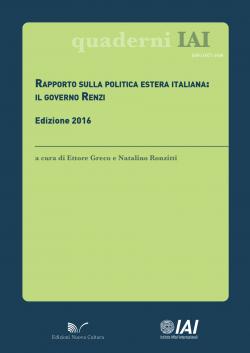Rapporto sulla politica estera italiana: il governo Renzi. Edizione 2016
Italy’s foreign policy, under the leadership of the Renzi government, is facing a number of interrelated challenges. Growing instability in the neighbourhood, the migration crisis, terrorism threats and financial troubles have all figured prominently in Italy’s foreign relations. Effective and lasting responses to these challenges can only be found at a European level, by strengthening solidarity and the ability of EU member states to act collectively. The European dimension has figured as the primary focus area of Italian foreign policy during the period of study. However, plans endorsed or promoted by the government in an effort to reform EU policies and strengthen the mechanisms and instruments of integration and solidarity among member countries in key areas such as economic governance and migration policy have witnessed limited progress. There were also periodic tensions with European institutions, resulting in a renewal of old disputes over the division of tasks and responsibilities between EU institutions and national governments. Persistent structural weaknesses have contributed to limit Italy’s foreign influence and projection, yet government efforts to enhance Italy’s role in various areas of primary national interest, beginning with the Mediterranean, have yielded some significant results. Italy has continued and in some cases strengthened its contribution to international missions of a civil and military nature, while also assuming command responsibilities in some settings. Efforts to reform and improve Italy’s military have slowed and in the legal domain the country needs to fill certain gaps that continue to undermine Italy’s international credibility.
Presented at the conference "La politica estera del governo Renzi e le opzioni post-Brexit", Rome, 21 July 2016. Available in English: Chapter 1.1 (Ruolo e posizioni in Europa), published as "Italy's Role in Europe under Renzi" in (Documenti IAI 15|20) and Chapter 2 (La politica di sicurezza e difesa), published as "Recent Developments in Italy's Security and Defence Policy" (Documenti IAI 15|19).
-
Details
Roma, Nuova Cultura, July 2016, 155 p. -
In:
-
Issue
17 -
ISBN/ISSN/DOI:
978-88-6812-713-8
Lista degli Autori, p. 7-8
Lista degli acronimi, p. 9-10
1. Le scelte in Europa
1.1 Ruolo e posizioni in Europa, di Ettore Greco, p. 13-19
1.2 L’agenda economica dell’Unione europea, di Ferdinando Nelli Feroci, p. 21-25
1.3 La governance economica europea, di Fabrizio Saccomanni, p. 27-33
1.4 La riforma delle istituzioni, di Gianni Bonvicini, p. 35-39
1.5 La politica estera europea, di Nicoletta Pirozzi e Lorenzo Vai, p. 41-45
2. La politica di sicurezza e difesa, di Alessandro Marrone e Vincenzo Camporini, p. 47-55
3. Strategia e priorità della politica migratoria, di Marcello Di Filippo, p. 57-63
4. La politica energetica, di Nicolò Sartori, p. 65-69
5. La cooperazione allo sviluppo, di Luca De Fraia, p. 71-74
6. La promozione dell’italiano, di Iacopo Viciani, p. 75-78
7. Il conflitto in Ucraina e le sanzioni contro la Russia, di Giovanna De Maio e Daniele Fattibene, p. 79-83
8. Conflitto e cooperazione nel Mediterraneo e in Medio Oriente
8.1 Il conflitto in Libia, di Roberto Aliboni, p. 87-91
8.2 Siria, Iraq e Palestina, di Andrea Dessì, p. 93-99
8.3 Egitto, di Azzurra Meringolo, p. 101-105
9. L’Africa subsahariana, di Nicoletta Pirozzi, p. 107-111
10. I rapporti con la Cina, di Giovanni Andornino, p. 113-116
11. Internazionalizzazione e attrazione degli investimenti esteri, di Andrea Renda, p. 117-120
12. La politica spaziale, di Jean-Pierre Darnis e Alessandra Scalia, p. 121-125
13. Problemi di diritto internazionale, di Natalino Ronzitti, p. 127-136
Sintesi, p. 137-147
Appendice documentaria con statistiche, p. 149-155
Topic
Tag
Related content
-
Ricerca22/07/2014
IAI report on Italian foreign policy
leggi tutto



